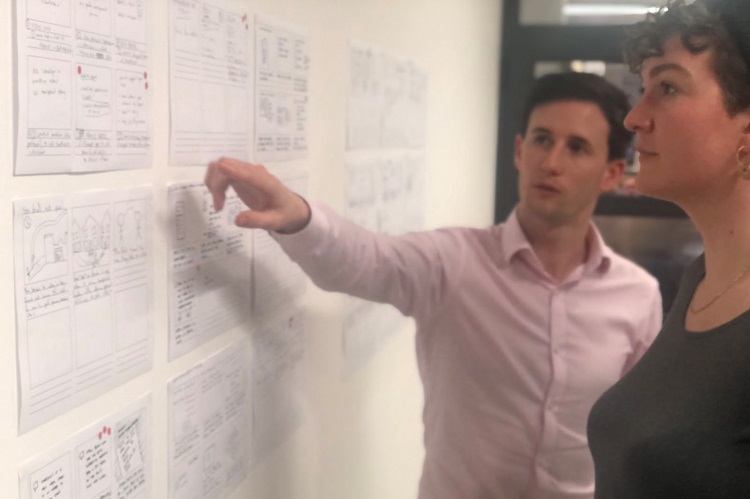28th October 2020
Concentric Health and Accelerate: The Story so Far
Find out how Concentric Health, a Welsh health technology start-up, collaborated with Accelerate to support patients and clinicians to make better healthcare decisions.
Ed St John and Daf Loughran, both clinicians and Concentric Health’s co-founders, had been searching for ways to support their consent conversations with patients. However, they soon discovered that not many options existed – processes were paper-based, and difficult to tailor to patients. They decided to create their own digital consent platform, which would streamline and improve shared decision-making between patients and clinicians. With the help of Accelerate, and an Innovate UK grant, Concentric launched their app earlier this year, and it is already in use across a number of NHS Trusts and Health Boards.
Why the need for change?
The team’s mission is to transform for the better how we all make decisions about our health, especially at times of key decisions around operations, procedures and invasive treatments. Before undertaking any of these treatments consent needs to be given by the patient. It’s currently a paper-based, error-prone process which isn’t designed to support patients.
A study found that approximately half of paper consent processes show a clinically significant omission in their documentation. These omissions include: core and important risks being omitted or not documented by the clinician, missing form fields (for example, patient details), or illegible handwriting.
In 2019, Concentric Health approached the Accelerate programme, a £24m European Region Development Fund (ERDF) and Welsh government-funded project, to discuss the possibility of a collaboration. The Concentric team is composed of clinicians and developers, and was keen to explore opportunities to undertake in-depth user research, particularly from the patient perspective, and academic clinical evaluation of the deployments that were soon to start in health boards.
The Accelerate programme is composed of four partners, each of which offers a different specialism, from user experience research, to clinical evaluation, to wet laboratory research. After considering different project possibilities, Concentric landed on a user study as a clear opportunity to add value to their product.
Dr Daf Loughran, Concentric Health CEO, said:
“Collaborating with ATiC is fantastic, we’re being supported by Caroline and others who have deep expertise in user research in a way that wouldn’t otherwise be possible for a start-up. I’m excited by the ongoing collaborative opportunities, especially in starting to utilise the world-leading technologies available at ATiC’s technology lab.”
The following video demonstrates how the application works today:
How did ATiC help?
ATiC, one of the four Accelerate partners, joined the Concentric team to do a deep investigation of what users really need from the platform. They aimed to improve the Concentric product by considering new features which would make a difference to patients and clinicians.
Dr Caroline Hagerman, Innovation Fellow at ATiC, explained
“We looked at how we could facilitate conversations between Concentric and surgeons and patients. What information, support, or resources might patients want while going through this emotionally taxing process? We also looked at how patients could really have a stake in their treatment and their care.
We started out by speaking to patients and clinicians and heard stories from patients who had recently undergone surgery. We asked, “what was it like? How did you feel? What was missing and what could have helped? Before long a few themes came through loud and clear.”

Dr Daf Loughran and Dr Caroline Hagerman working in collaboration to transform the interview insights into themes and directions for Concentric
What really struck the team was the fact that all patients wanted much more support throughout the process, from diagnosis to recovery. They also wanted help absorbing and making sense of information, which was often presented quickly in verbal consultations.
Patients also explained that they wished they’d been encouraged to reflect upon the impact of the surgery on their lives.
One patient that was interviewed said:
“I didn’t understand the risks, consequences and benefits of the surgery I was having. I would have liked a decision tree to help me understand, and maybe something explaining the process of surgery as well.”
Importantly, they also spoke to surgeons, who described real challenges in sharing complex information in a way that patients could understand and absorb, but was at the same time complete enough to fulfil legal requirements. They wished they could spend more time with patients, but often felt as though they were fighting a losing battle trying to get patients to truly engage with a decision.
As one clinician frankly put it:
“The traditional understanding of [surgical] decision-making is thought to be giving information about procedure options, making a ‘rational decision’, and then signing the paper. This is nonsense – what this style of decision-making really amounts to is bashing people over the head with information and then getting them to sign a piece of paper. Medicolegally, the process follows the requirements, but it’s a disaster on the human side.”
Concentric during Coronavirus
In this video you can hear first-hand the experience of using Concentric to give consent remotely during the Coronavirus pandemic:
What happens next?
Concentric are now transforming these insights into high-impact features for the Concentric platform. In the process they are creating something truly new: a product that breaks down barriers for patients to access information about their condition and treatment and empowers them to join in the conversation and get help from clinicians and their support network.
Find out all about the second phase of Concentric’s project, and how they are striving to improve the patient journey

